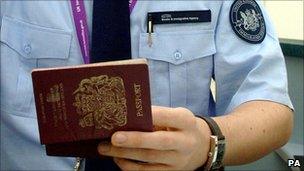Warning of public sector strike threat to UK travel
- Published

Some travellers arriving in the UK may experience delays due to the strike
Travellers have been warned to expect delays on arrival at UK ports and airports on Thursday as hundreds of immigration and customs officers are due to join the public sector strike.
About 600,000 teachers and civil servants are due to strike over planned pension changes they say will mean them working longer and paying more.
Prime Minister David Cameron told the Commons there was no case for strikes.
He said government plans were "fair to taxpayers" and the public sector.
Addressing Parliament during prime minister's questions, Mr Cameron said: "I don't believe there is any case for industrial action tomorrow, not least because talks are still on-going."
"It's only a minority of unions who have taken the decision to go ahead and strike."
"What we are proposing is fair. It is fair to taxpayers but it is also fair to the public sector because we want to continue strong public sector pensions," he said.
Earlier, Deputy Prime Minister Nick Clegg said the strikes "aren't going to help the millions of members of the trade union movement and they're not going to help the country".
He told the Local Government Association conference: "We are absolutely adamant in government that this issue can only, and must only, be resolved through dialogue and discussion, not through strikes and conflict."
The industrial action may affect people arriving in the UK because they are met by UK Border Agency staff, some of whom are members of the Public and Commercial Services (PCS) union who are set to strike.
However, people leaving the UK will not be affected because departing passengers come into contact with security staff, employed by airport operator BAA, who will not be taking industrial action.
BAA, which runs Heathrow, Stansted, Edinburgh, Glasgow, Aberdeen and Southampton airports, said: "We have been informed by the UK Border Agency that arriving passengers should expect delays at immigration on Thursday as a result of industrial action by immigration officers who are members of the PCS union.
Nick Clegg: "We have to keep on talking and sort it out"
"UK Border Agency has now changed its advice to passengers and is no longer advising that those who can do so may wish to travel on other dates. We're disappointed that industrial action by PCS may lead to disruption for people arriving in the UK tomorrow."
The airport operator said the UK Border Agency had "introduced contingency plans to manage the situation".
Immigration workers who are part of PCS are set to go on strike from 1800 BST on Wednesday and the union said there could be "some residual delay" into Friday morning once the strike is over as workers come back on shift.
More than 3,000 schools in England and Wales will be closed, and some 2,200 partially closed, the government has said, because of 24-hour strike action by members of the National Union of Teachers (NUT) and the Association of Teachers and Lecturers (ATL).
Pensions 'affordability'
Announcing the figures on Tuesday, Education Secretary Michael Gove said the situation with another 10,872 schools was "not at that stage known".
Business leaders have warned of the impact of the walkout on the economy.
The British Chambers of Commerce said many parents would lose pay for taking the day off work to look after their children, and productivity would be hit.
"Public sector pensions have long faced problems of affordability, and reforms to bring them into line with those in the private sector are essential," said director general David Frost.
"The reality is that our workforce is living longer, and pensions need to reflect this to be sustainable in the long term.
"The private sector has had to wake up to the tough realities of pension provision in a rapidly changing world, and the public sector must do the same."
'Work as normal'
Members of the University and College Union (UCU) are also involved in Thursday's strike action.
Labour leader Ed Miliband said the strikes would be a "mistake", and that both sides should get back round the negotiating table.
"Public sector pensions do need to be reformed," he said.
"But the government has to take its share of responsibility for the provocative way they have handled these negotiations."
Mr Miliband's spokesman said: "Labour MPs will be coming to work as normal."
And a spokesman for Prime Minister David Cameron said the strike would not affect the working of the PM's office.
Pressed on whether any of around 200 members of staff at Number 10 would go on strike, he said it would be "low numbers if any".
- Published29 June 2011
- Published29 June 2011
- Published10 September 2012
- Published29 June 2011
- Published29 June 2011
- Published28 June 2011
- Published27 June 2011